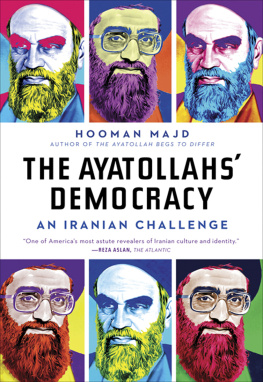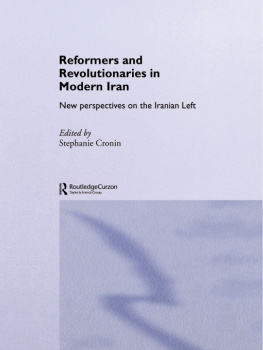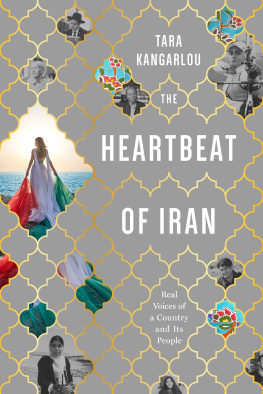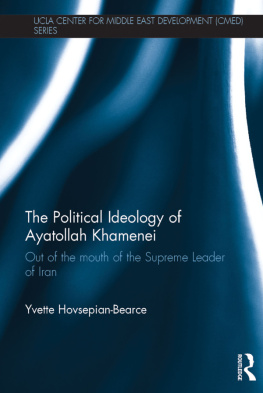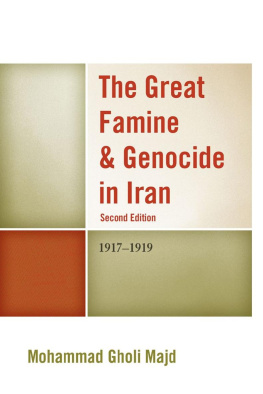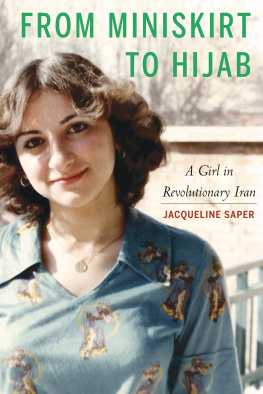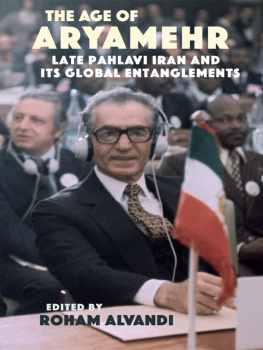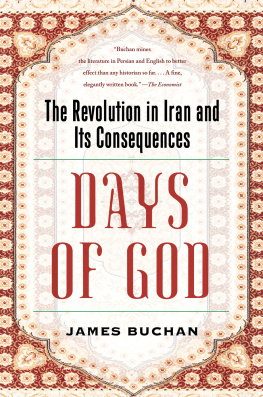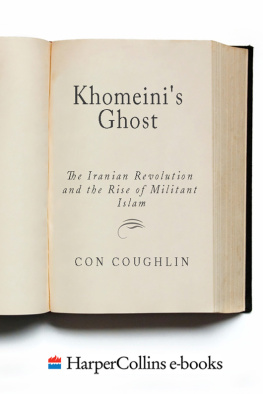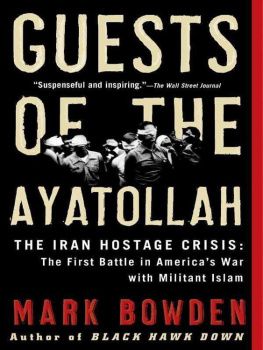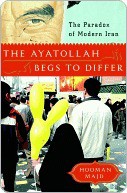

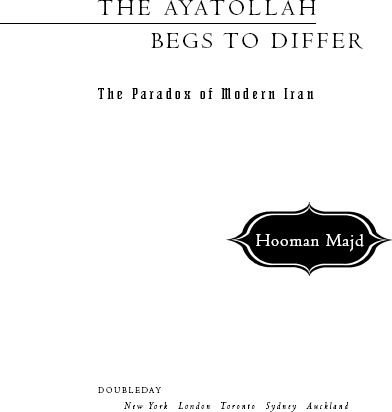
Contents
For Nasser and Badri
Acknowledgments
I have based this book mostly on personal experience. In 2004 and 2005 I spent several weeks in Iran as a journalist, and in 2007 I spent almost two months living in Tehran, working on what was to become the manuscript. Both in Iran and in the United States, I have relied on my family, friends, and contacts as sources (as well as many other ordinary Iranians I have spoken to in Iran), some of whom I acknowledge in the text and others whose identities I have disguised for their own safety or who wish to remain anonymous. I have also served on a few occasions as an unpaid adviser to the Islamic Republic, bringing me into close contact with Presidents Khatami and Ahmadinejad and numerous members of their staffs, who have all contributed to my knowledge.
I am particularly grateful to President Mohammad Khatami, who took time out of his schedule, both during his presidency and afterward, to engage in long discussions with me and to answer my many questions, and to his brother (and chief of staff) Seyyed Ali Khatami, who spent even more time with me and who introduced me to many other influential Iranians, most of whom I continue to speak with on a regular basis. I learned more about the intricacies of the politics (and the history) of the Islamic Republic from Ali Khatami than I could have from reading dozens of books, and he gave me invaluable lessons on the personalities of the characters who make up the ruling elite of Iran.
I am deeply indebted to the former UN ambassador Mohammad Javad Zarif for his keen insights (and his patience with me) and to the ambassadors Hossein Fereidoun, Sadeq Kharrazi, and Mehdi Danesh-Yazdi, all of whom contributed to my understanding of the politics of the Islamic Republic. Im also grateful to Foreign Minister Manouchehr Mottaki for the time he set aside to meet with me on his visits to New York.
In addition to those who are already named as characters in various chapters, I would like to thank the following persons in Iran, in no particular order, for their assistance and their contributions to my knowledge: Ali Ziaie, Mohammad Ziaie, Amir Khosro Etemadi, Seyyed Hossein Khatami, Maryam Majd, Mohammad Mir Ali Mohammadi, and Mehrdad Khajenouri.
Finally, Id like to thank my editor, Kristine Puopolo, and my agent, Lindsay Edgecombe, and her colleague James Levine for their hard work in making this a readable book. And, of course, thanks to my father, Nasser Majd, and my mother, Mansoureh Assar, for what theyve taught me; and to Karri Jinkins, Davitt Sigerson, Michael Zilkha, Selim Zilkha, Simon Van Booy, Daniel Feder, Eddie Stern, Michael Halsband, Paul Werner, Suzy Hansen, Roger Trilling, Glenn OBrien, and Ken Browar.

INTRODUCTION
Yeki-bood; yeki-nabood. Thats how all Iranian stories, at least in the oral tradition, have begun, since as long as anyone remembers. There was one; there wasnt one, as in There was a person (once upon a time); but on the other hand, no, there was no one. Often, the saying continues with Gheir az Khoda, heech-kee nabood, or Other than God, there was no One, a uniquely Persian obfuscation of the Muslim Arabic Lailla ha ilallah (There is no God but Allah), and which one might think makes much less sense than the original, but is in a way perfectly reasonable. Introduce a young mind to the paradoxes of life with a paradox, you see, which is what most of the Iranian folk stories are about in the first place. As a child, I heard those stories alongside English equivalents (which of course began with the seemingly far more sensible Once upon a time), but it never occurred to me then that the simple Yeki-bood; yeki-nabood said so much about the inherited culture that so deeply penetrated my otherwise Western life.
Yeki-bood; yeki-nabood. Yes, we are about to hear a fantasy, but waitis it a fantasy? While most Iranian stories that begin so are indeed fantasies, the fantastic Shia stories of early Islam are thought to be true history by the legions of believers in the faith, and if evoked, Yeki-bood wraps itself in religious significance as well as the Persian art of the epic. On one of my trips to Iran, to Qom to be precise, I picked up some CDs of noheh, Shia religious incantations, usually sung to huge crowds on religious holidays, that tell the stories of Shia saints and their martyrdom. One CD contained a rather mellifluous version of the story of Fatimeh Zahra and Ali (the daughter and son-in-law of the Prophet) that began with Yeki-bood; yeki-nabood and continued with zeer-e gonbade kabood, or under the bruised [or dark] dome [or sky], alluding not just to the Islamic roots of There was one, there wasnt one but also to the Shia sense of the world as a dark and oppressive place. The singer claimed the tale to be one of estrangement and woe, central themes in Shiism. There is no God but God, there was one and there wasnt one, other than God there was no One, and the world is under a perpetual dark cloud. Welcome to Shia Iran.

Iran is better known today by the outside world than at almost any time in its history, certainly since the fall of the Persian Empire, mostly because of the Islamic Revolution, which to many ushered in an era of successful but much-feared Islamic fundamentalism. As a child, I had to patiently explain to new friends in school where and exactly what Iran was, if they even bothered to inquire about my strange name; today I suspect that young Iranians have no such problems. When I look back now, both in my childhood and even as a young adult, I couldnt have imagined my country as anything more than a second-rate Third World nation subservient to Western powers: had someone seriously suggested to me, or any other Iranian for that matter, that the United States would one day be proposing to build a missile defense system in Europe to guard against an attack by Iran (as the United States has, to the great consternation of the Russians), with Iranian-made missiles, I would have instantly labeled that person as stark raving mad. Despite the negative connotations of a perceptibly hostile Iran, Iranians of a certain age can be forgiven for feeling a tinge of pride in their nations rapid ascent to a position of being taken seriously by the worlds greatest superpower, and all in just a little over a quarter of a century. One might argue whether Iran and Iranians would have been better off without the Islamic Revolution of 1979, but it is indisputable that had it not happened, Iran today would likely not have much of a say in global affairs.
Rightly or wrongly, the revolution and the path the nation took after its success have led to Irans prominence and repute, but of course at the time Iranians could hardly have known that their revolt would have such far-reaching consequences and effects. For two or three hundred years Iran had been, in all but name, a proxy of Western powersspecifically Britain and then the United States when it took over the mantle of empire after World War II. Iranians overthrew a twenty-five-hundred-year monarchy in 1979 to liberate themselves from an autocratic dictator as much as to liberate themselves from foreign domination (a factor that most in the West did not understand at the time and that was also partly the motivation for the takeover of the U.S. Embassy), and for almost thirty years now, whatever can be said about Iran, it cannot be said that it is subservient to any greater power.
Next page

